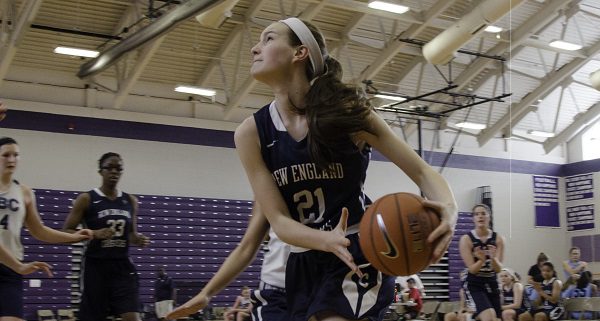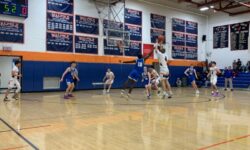[ccfic caption-text format="plaintext"]
By Robert Rosen
Hometown Weekly Staff
Over the past two decades there has been an explosion in the number of kids playing basketball year-round, with new programs popping up regularly and the established programs continuing to provide opportunities to kids by giving them the chance to learn the game, develop their skills, face tougher competition and get more exposure from outside their hometowns, ultimately giving some the opportunity to play at the next level when they may not have had that chance before.
AAU basketball has changed the way high school basketball players improve their games, as they face greater competition from a wider area as they travel around their state, region and even to other parts of the country. It has allowed college coaches from large and small schools to see players that they otherwise would not have seen had they not played outside of their small hometowns in areas that aren’t necessarily easily accessible for people outside a particular area.
“The competition was much better,” said Shannon Prince, a former two-time all-conference center at the University of Memphis. “The travel led to me being nationally recruited. It provided a national stage. The competition was better. I played with three players who went to Louisiana Tech, including Karl Malone’s daughter (Cheryl Ford). How’d I end up at Memphis? AAU.”
Across the Boston area, including the MetroWest region and the south shore, teenagers play for a plethora of AAU programs whose mission is to provide them the opportunity to play more games and get them more exposure to college coaches.
Locally, players such as Wellesley High girls’ basketball captain Dorian Cohen and her teammate Leo Sperling play basketball all year in order to hone their game on the court and be able to improve their skills. Cohen and Sperling play for the New England Crusaders.
“So many people are playing,” said Shyrone Chatman, as assistant men’s basketball coach at UMass. “You can’t afford not to play. The exposure is more than just where you live. It’s other states, other countries.”
Added Prince, who served as an assistant coach for the women’s team at the University of Southern Mississippi, “If you really want a scholarship you have to play AAU.”
As a player, the traditional high school season in the winter usually yields games against other area high schools. Here in Massachusetts, schools are members of conferences and play other schools in those conferences. Sometimes the competition might be good, but a down year in the conference can lead to a player competing against subpar competition and can force that player’s game to not develop as much as it would’ve.
By playing AAU year-round, players are able to face tougher competition, which in turn allows them to develop their games.
“It was important [to play AAU for me],” said Chatman, a point guard who led Memphis to an NIT semi-final as a player in 2001. "I got to see other guys, other talent. It set the bar. It set the standard and showed me what I needed to improve on and let me know where I was.”
With so many AAU programs to choose from, both across the state, regionally and locally, how do parents and kids know which one to choose from? According to Prince, it’s really all about the coach.
“Find somebody who knows what they’re doing,” she said. “Someone who cares about the kids and doesn’t cuss at them and yell at them. Someone who understands the game. Pay attention to who’s coaching your kid. Are thy trying to live out a fantasy or are they in it for the kids? It’s about all the kids, not just the star or their kid.”
AAU has gotten a lot of criticism over the years. Some have said that there are too many shady characters involved, while others feel that the addition of sponsors, such as major shoe companies, have hurt the innocence of the high school athlete.
But Prince and Chatman disagree with those notions, saying that the good far outweighs the bad, pointing to the increased amount of basketball the kids get to play and the increased amount of exposure they’re now able to get.
“I think it’s a good thing for kids,” Chatman said. “The amount of exposure kids can get provides opportunity.”
Robert Rosen is an Editor at Hometown Weekly. He can be reached at news@hometownweekly.net and followed on Twitter at @roberterosen.

























